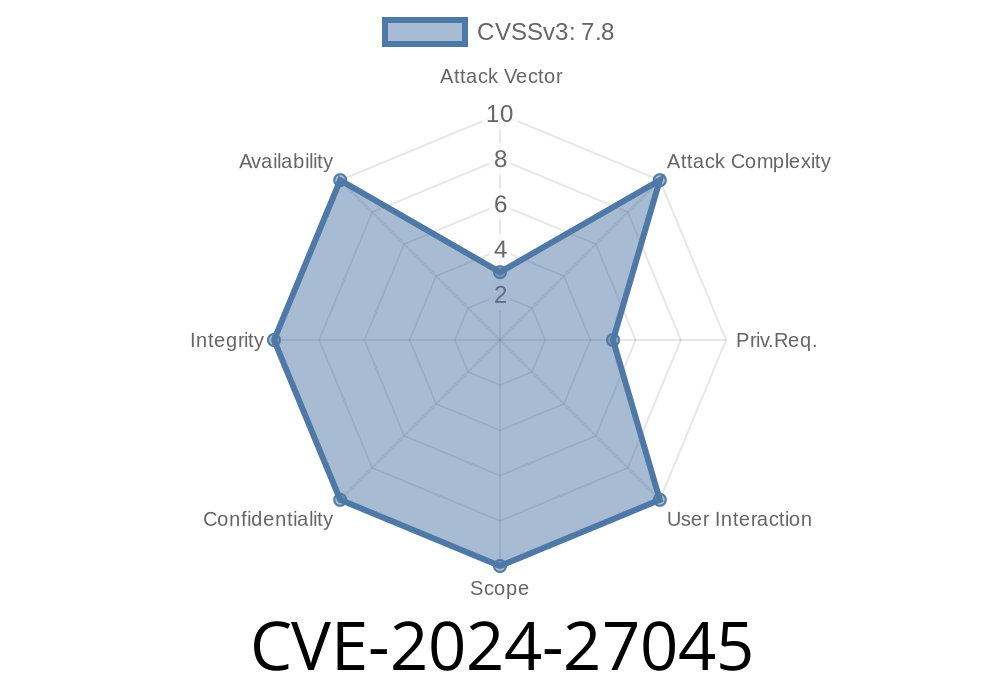A fresh Linux kernel vulnerability, CVE-2024-27045, was identified and fixed in the AMD display stack within the Direct Rendering Manager (DRM) subsystem. This bug, found in the function dp_dsc_clock_en_read(), could result in a buffer overflow due to improper use of snprintf(), which could print up to 30 bytes into a buffer only meant for 10.
In this post, we’ll dig into what happened, why it mattered, and what the fix looks like—with crystal-clear explanation, code snippets, and context for security newcomers and Linux kernel enthusiasts alike.
The Vulnerability: What Was Broken?
The problem lay in the AMD GPU Display Manager in the kernel, specifically within a debug filesystem interface (debugfs). The function dp_dsc_clock_en_read() was supposed to output status information for debugging purposes.
Here’s the code before the fix
static ssize_t dp_dsc_clock_en_read(struct file *f, char __user *buf,
size_t size, loff_t *pos) {
char tmp[10];
...
snprintf(tmp, 30, "%d\n", <some_value>);
...
}
Notice the problem? snprintf() is asked to write up to 30 characters, but the destination buffer tmp can only take 10 bytes. If <some_value> is large or unexpected input slipped through, the bug could lead to memory corruption or a kernel panic. This could be exploited (under the right conditions) to crash the system or, in rare cases, escalate privileges.
Here’s what the fix looked like
snprintf(tmp, 10, "%d\n", <some_value>);
Now, at most, 9 bytes plus the null terminator will go into tmp, avoiding any unsafe overwrite.
Related kernel commit: amd/display: Fix a potential buffer overflow in dp_dsc_clock_en_read()
How Could This Be Exploited?
- Local users with access to debugfs could potentially force the function to output an oversized value, overwriting memory immediately past the buffer.
In rare circumstances, controlled memory corruption (potential privilege escalation).
NOTE: This is mostly a *local threat*, requiring debugfs access, which is typically root-only or restricted to trusted users. But on systems where debugfs is world-readable or improperly secured, risk is higher.
A simplified snippet to demonstrate the bug's core issue
#include <stdio.h>
int main() {
char tmp[10];
// Unsafe: Format string can be longer than tmp[]
snprintf(tmp, 30, "%d\n", 123456789); // 123456789 is 10 digits + newline!
printf("Buffer: %s", tmp);
return ;
}
If you bump the number higher, you could cause overflow in more complex real-world contexts.
- In kernel space, this is much more dangerous than in user space—even a single byte overrun can crash your OS.
How To Stay Safe
- Kernel updates: Install the latest updates for your distribution, as this fix is now patched upstream.
References
- Linux Kernel Git commit for the fix
- CVE-2024-27045 summary on NIST NVD
- LKML Patch Discussion
- AMDGPU Kernel Display Code
In Conclusion
CVE-2024-27045 teaches a classic lesson in kernel safety: even the smallest oversight—like a wrong number in a snprintf() call—can open up the system to crashes or compromise. Thanks to quick action from Linux maintainers, the vulnerability has been patched, but this is a good moment to check your own code for similar bugs.
Timeline
Published on: 05/01/2024 13:15:49 UTC
Last modified on: 12/23/2024 19:13:59 UTC
